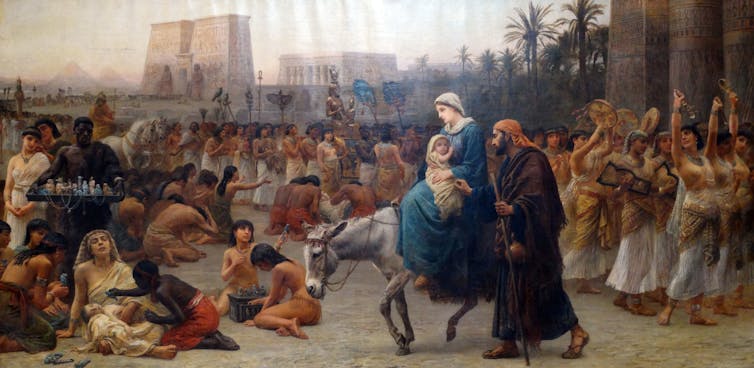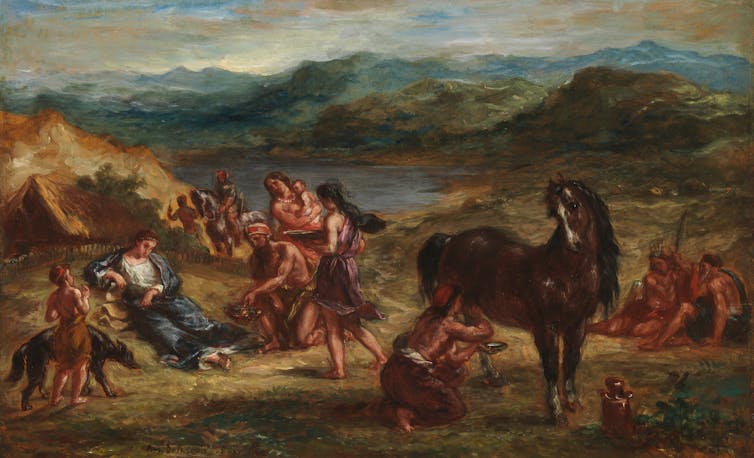
Experts in autocracies have pointed out that it is, unfortunately, easy to slip into normalizing the tyrant, hence it is important to hang on to outrage. These incidents which seem to call for the efforts of the Greek Furies (Erinyes) to come and deal with them will, I hope, help with that. As a reminder, though no one really knows how many there were supposed to be, the three names we have are Alecto, Megaera, and Tisiphone. These roughly translate as “unceasing,” “grudging,” and “vengeful destruction.”
A great deal of nonsense get bruited about concerning immigrants, migrants, and refugees, and this week it has been especially prominent, much of it spewed by soi-disant Christians. One would think that no other nation had ever had it so bad (to an extent that may be true – but to that extent, the problem is of our making – no immigrants are at fault. Unless you count those who invaded and leaned on Native Americans. Oh, wait – that’s also us.) And yet, it’s not all that difficult to go to antiquity – including Biblical antiquity – and learn a thing or two. Of course, that requires effort. Well, here, let me help.
================================================================
Jesus, Paul and the border debate – why cherry-picking Bible passages misses the immigrant experience in ancient Rome

Universal History Archive/Universal Images Group via Getty Images
Rodolfo Galvan Estrada III, Fuller Theological Seminary
Immigration reform is back on the agenda, with Congress taking up major legislation that could usher in a pathway to citizenship for millions of people living in the U.S. without legal status.
This, and an increase in migrants crossing the southern border to the U.S., has seen many people retreat to two common positions on the issue. Advocates for reform generally emphasize the history of America as a nation of immigrants. Meanwhile, opponents draw to the identity of America as a nation based on the rule of law, with a sovereign right to protect its borders.
Given the role that Christianity plays in many Americans’ lives and in politics in general, it shouldn’t be surprising that people from the religious right and left draw from the Bible to support their immigration perspectives.
Biblical stories
Former U.S. Attorney General Jeff Sessions, for example, drew upon the Apostle Paul’s view of the government to back his support for child separation immigration policies at the border. “I would cite you to the Apostle Paul and his clear and wise command in Romans 13, to obey the laws of the government because God has ordained them for the purpose of order,” he stated. For those in favor of a more progressive policy on immigration, there are numerous passages in the Bible that indicate a willingness to welcome strangers and foreigners.
The truth is, the Bible has many stories of migration, beginning in the book of Genesis with Adam and Eve migrating from the Garden of Eden and concluding with the book of Revelation, where John, traditionally known as the apostle, lives as a deported criminal on Patmos, an island located west of Turkey.
As a New Testament scholar, my research on how foreigners are portrayed during the first century has led me to recognize that selecting a few texts from Jesus’ teaching on welcoming the foreigner or the Apostle Paul’s teachings on the government does not provide the full story on the immigrant experience.
In reality, their experience was politically and culturally complex. Immigrants in Rome during the time of Jesus and Paul encountered suspicion and hostility from the imperial authorities and Roman natives.
Unfriendly Romans and noncountrymen
Many foreigners in the capital of Rome were immigrants. David Noy, a scholar of classical literature, finds that they came to the empire either as captured slaves or voluntarily migrated in search of better opportunities.
Some ancient Roman writers during the time of Jesus viewed the presence of immigrants negatively. Nostalgia for a time when Rome was less influenced by outsiders emerged among Roman elites. Ancient Roman writers Pliny and Seneca believed that as the empire extended, the foreigners culturally conquered the Romans by negatively influencing the Roman way of life.
There was a “strong sense that Rome was losing vigor and vitality through its luxuries and a fear of being undermined by foreign immigrants from among the subjugated people,” according to classical literature scholar Benjamin Isaac.
To counter this immigrant threat and presence in Italy, the Romans enacted the imperial power of expulsion. The Roman historian Livy remarks that those who introduced foreign religions were frequently expelled for failing to adopt to “the Roman way.”
Suetonius, another Roman historian, records that emperor Claudius, who ruled in the decades following Jesus’ death, banned foreigners from using a Roman name and expelled the Jews from the city of Rome. Interestingly, this Jewish expulsion also shows up in the New Testament with the expulsion of the Christian missionary couple Priscilla and Aquila from Rome in A.D. 49.

Heritage Art/Heritage Images via Getty Images
Expulsions were not always permanent or reserved for foreigners. Most famously, the Roman poet Ovid was expelled for writing controversial erotic literature. He was deported to the land of Tomis, current Romania.
[You’re smart and curious about the world. So are The Conversation’s authors and editors. You can read us daily by subscribing to our newsletter.]
Welcoming strangers
Understanding the reality of immigrants and their status during the birth of Christianity shapes how Jesus’ teachings are understood. At the time when Jesus tells his disciples about the necessity of “welcoming the stranger,” this was the righteous response to the political tragedy of a fellow human being. To deny them hospitality would be a death sentence. Not all immigrants migrated for economic reasons – for some it was their only life option because of the imperial act of expulsion.
Knowing that immigrants could be expelled for negatively influencing the Roman culture must also shape our understanding of Paul’s teaching to “submit” to Roman authorities. Since Paul was a Roman citizen, it would have been instinctive to instruct other Christians living in Rome to maintain political peace with the empire. As with Ovid, being a Roman citizen did not exempt them from being treated like foreigners. The empire was indiscriminate in its deportation power, and citizens like Paul who introduced non-Roman religions were not exempt.
The U.S. immigration debate continues to be controversial. Whenever the writings of Paul or teachings of Jesus are introduced into the debate, we need to understand the context of the time. The Roman imperial power of deportation had life-and-death implications for immigrants and citizens.
Furthermore, during the time of Jesus and Paul, both Roman citizens and noncitizens could be deported from Rome. But foreigners who introduced non-Roman cultures in Rome were more likely to be expelled for being perceived as threats.
Kristin Kobes Du Mez, professor of history at Calvin University, notes that White evangelical Christians appear “more opposed to immigration reform, and have more negative views about immigrants, than any other religious demographic.” Perhaps for some evangelicals, discomfort and suspicion with outsiders lies at the root of anti-immigrant policies as it did during the time of Romans.

Rodolfo Galvan Estrada III, Adjunct Assistant Professor of the New Testament, Fuller Theological Seminary
This article is republished from The Conversation under a Creative Commons license. Read the original article.
================================================================
Alecto, Megaera, and Tisiphone, the Greeks from whom your stories are passed down to us also knew a thing or two about refugees also. The Theater of War, which uses professional actors performing excerpts from Greek plays along with group discussion and sometimes music to help people get in touch with issues which are by no means new, but which tend to hit people as if no one else has ever experienced them, is presenting “The Suppliants Project” on refugees and those whom they approach for help. It will take place via Zoom on April 14th (a Wednesday) between 7:30 pm and 9:30 pm Eastern. There is no charge to watch (or comment) but reservations must be made in advance. I have my ticket. Whoever wishes can get more information here and/or see a trailer here.
The Furies and I will be back.
6 Responses to “Everyday Erinyes #259”
Sorry, the comment form is closed at this time.

And I would add that Fuller Seminary is considered among those which teach a more conservative theology. A worthy find to share Joanne and gets to how often we hear scriptures quoted out of context where the mean is much different than when quoted in context.
For me, anyway, taking a Biblical perspective on immigration, is beside the point. One does not have to follow a religion, any religion, to try to live by ethical concepts that involve humanity, and compassion.
This is supposed to be a country based on the rule of law, with separation of church and state, but too often the rule is cited by religionists for their own “Cherry Picked” agenda.
The GOP agenda is only the preservation of their power and control, compared to which people’s safety is irrelevant.
Interestingly, just as the U.S. did in regard to Mexico, the Romans did with their own wars, gobbling up other countries and cultures.
In any case RESIST!!!!!!!!!!!!!!
thank you………
What Mich said.
To me, cherry-picking biblical passages amounts to exactly the same as cherry-picking history to try and win points in a debate that shouldn’t take place in the first place.
It might be convenient to have an authoritatively-viewed source at the ready. But its Achilles heel is that you can find a Bible verse to support virtually any view.
To my mind, that drastically undermines its credibility. (But I’ll admit to using it when it’s helpful. I’m not going to forfeit an advantage like that to the Talibangelical christianists!)
Yes. I’m with you on that.